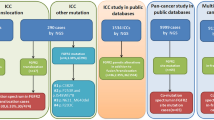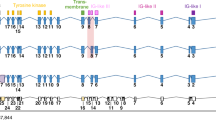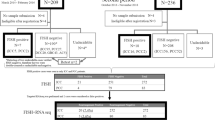Abstract
Background
FGFR2 genomic alterations are observed in 10–20% of cholangiocarcinoma (CCA). Although FGFR2 fusions are an important actionable target, FGFR2 protein expression has not been thoroughly characterized.
Aims
To evaluate FGFR2 protein expression in cholangiocarcinoma harboring FGFR2 genomic alterations.
Methods
FGFR2 protein expression was evaluated in 99 CCA cases with two different antibodies. FGFR2 genomic alterations were confirmed via next-generating sequencing (NGS) or FISH. Primary objective was to determine the specificity and sensitivity of FGFR2 immunohistochemistry staining for detecting FGFR2 genomic alterations. Secondary objectives included overall FGFR2 immunohistochemistry staining in CCA patients, and evaluation of whether FGFR2 expression correlates with clinical outcomes including overall survival (OS), progression-free survival (PFS), and time-to-tumor recurrence (TTR).
Results
Immunohistochemistry staining with two antibodies against FGFR2, FPR2-D, and clone 98706 showed high accuracy (78.7% and 91.9%) and specificity (82.9% and 97.7%), and moderate sensitivity (53.9% and 57.1%), respectively, when compared with the standard methods for detecting FGFR2 genomic alterations. In a median follow-up of 72 months, there were no statistically significant differences in OS, PFS, and TTR, for patients with positive or negative FGFR2 staining.
Conclusion
FGFR2 protein expression by immunohistochemistry has high specificity and therefore could be used to imply the presence of FGFR2 genomic alterations in the context of a positive test. In the case of a negative test, NGS or FISH would be necessary to ascertain cases with FGFR2 genomic alterations.



Similar content being viewed by others
References
Ross JS, Wang K, Javle MM et al. Comprehensive genomic profiling of biliary tract cancers to reveal tumor-specific differences and frequency of clinically relevant genomic alterations. J Clin Oncol 2015;33:40009. https://doi.org/10.1200/jco.2015.33.15_suppl.4009.
Goyal L, Govindan A, Sheth RA et al. Prognosis and clinicopathologic features of patients with advanced stage isocitrate dehydrogenase (IDH) mutant and IDH wild-type intrahepatic cholangiocarcinoma. Oncologist 2015;20:1019–1027.
Farshidfar F, Zheng S, Gingras MC et al. Integrative genomic analysis of cholangiocarcinoma identifies distinct IDH-mutant molecular profiles. Cell Rep 2017;19:2878–2880.
Graham RP, Barr Fritcher EG, Pestova E et al. Fibroblast growth factor receptor 2 translocations in intrahepatic cholangiocarcinoma. Human pathology 2014;45:1630–1638.
Arai Y, Totoki Y, Hosoda F et al. Fibroblast growth factor receptor 2 tyrosine kinase fusions define a unique molecular subtype of cholangiocarcinoma. Hepatology 2014;59:1427–1434.
Javle M, Lowery M, Shroff RT et al. Phase II study of BGJ398 in patients with FGFR-altered advanced cholangiocarcinoma. J Clin Oncol 2018;36:276–282.
Lipika G, Hendrik-Tobias A, Ben T et al. Early clinical efficacy of TAS-120, a covalently bound FGFR inhibitor, in patients with cholangiocarcinoma. Ann Oncol 2017;28:ii145.
Papadopoulos KP, El-Rayes BF, Tolcher AW et al. A Phase 1 study of ARQ 087, an oral pan-FGFR inhibitor in patients with advanced solid tumours. Br J Cancer 2017;117:1592–1599.
Abou-Alfa GK, Sahai V, Hollebecque A et al. Pemigatinib for previously treated, locally advanced or metastatic cholangiocarcinoma: a multicentre, open-label, phase 2 study. Lancet Oncol 2020;21:671–684.
Wu YM, Su F, Kalyana-Sundaram S et al. Identification of targetable FGFR gene fusions in diverse cancers. Cancer Discov 2013;3:636–647.
Xie D, Ren Z, Fan J, Gao Q. Genetic profiling of intrahepatic cholangiocarcinoma and its clinical implication in targeted therapy. Am J Cancer Res 2016;6:577–586.
Bogenberger J, DeLeon T, Arora M, Ahn D, Borad M. Emerging role of precision medicine in biliary tract cancers. NPJ Prec Oncol 2018;2:1–9.
Krook MA, Bonneville R, Chen H et al. Tumor heterogeneity and acquired drug resistance in FGFR2-fusion-positive cholangiocarcinoma through rapid research autopsy. Mol Case Studies 2019;5:a004002.
Eswarakumar VP, Lax I, Schlessinger J. Cellular signaling by fibroblast growth factor receptors. Cytokine Growth Factor Rev 2005;16:139–149.
Borad MJ, Champion MD, Egan JB et al. Integrated genomic characterization reveals novel, therapeutically relevant drug targets in FGFR and EGFR pathways in sporadic intrahepatic cholangiocarcinoma. PLoS Genet 2014;10:e1004135.
Choi CH, Chung J, Kim J, Kim B, Hewitt SM. Expression of fibroblast growth factor receptor family members is associated with prognosis in early stage cervical cancer patients. J transl med 2016;14:124. https://doi.org/10.1186/s12967-016-0874-0.
Ohashi R, Matsuda Y, Ishiwaka T, Naito Z. Downregulation of fibroblast growth factor receptor 2 and its isoforms correlates with a high proliferation rate and poor prognosis in high-grade glioma. Oncol Rep 2014;32:1163–1169.
Li CF, He HL, Wang JY et al. Fibroblast growth factor receptor 2 overexpression is predictive of poor prognosis in rectal cancer patients receiving neoadjuvant chemoradiotherapy. J Clin Pathol 2014;67:1056–1061.
Ahn S, Lee J, Hong M et al. FGFR2 in gastric cancer: protein overexpression predicts gene amplification and high H-index predicts poor survival. Mod Pathol 2016;29:1095.
Bekaii-Saab TS, Valle J, Borad MJ et al. Trial design for a phase 3 study evaluating pemigatinib (INCB054828) versus gemcitabine plus cisplatin chemotherapy in first-line treatment of patients with cholangiocarcinoma with FGFR2 rearrangement. J Clin Oncol. 2019. https://doi.org/10.1200/JCO.2019.37.4_suppl.TPS462.
Abou-Alfa GK, Borbath I, Clarke SJ et al. Infigratinib versus gemcitabine plus cisplatin multicenter, open-label, randomized, phase III study in patients with advanced cholangiocarcinoma with FGFR2 gene fusions/translocations: The PROOF trial. Ann Oncol 2019;30:v319–v320.
Hechtman JF, Benayed R, Hyman DM et al. Pan-Trk immunohistochemistry is an efficient and reliable screen for the detection of NTRK fusions. Am J Surg Pathol 2017;41:1547–1551.
Uruga H, Mino-Kenudson M. ALK (D5F3) CDx: an immunohistochemistry assay to identify ALK-positive NSCLC patients.". Pharmgenomics Pers Med 2018;11:147–155. https://doi.org/10.2147/PGPM.S156672.
Solomon JP, Linkov I, Rosado A et al. NTRK fusion detection across multiple assays and 33,997 cases: diagnostic implications and pitfalls. Mod Pathol 2020;33:38–46.
Pu XH, Ye Q, Yang J et al. Low-level clonal FGFR2 amplification defines a unique molecular subtype of intrahepatic cholangiocarcinoma in a Chinese population. Hum pathol 2018;76:100–109.
Acknowledgments
This work was supported by the National Institute of Health (NIH) through a DP2 Award CA195764 (to MJB); National Cancer Institute (NCI) K12 award CA090628 (to MJB), SPORE Project Award 5P50CA210964-03 (to GJG and MJB), SPORE Supplement Award 3P50CA210964-02S1 (to OB), K01 award CA234324 (to BN), Mayo Clinic Center for Individualized Medicine (CIM) Precision Cancer Therapeutics Program; and Mayo Clinic Cancer Center. The funders had no role in study design, data collection and analysis, decision to publish or preparation of the manuscript. Its contents are solely the responsibility of the authors and do not necessarily represent the official views of the NIH.
Author information
Authors and Affiliations
Corresponding author
Ethics declarations
Conflict of interest
This study was done in collaboration with Five Prime Therapeutics Inc. MJB has received grant to institution from Senhwa Pharmaceuticals, Adaptimmune, Agios Pharmaceuticals, Halozyme Pharmaceuticals, Five Prime Pharmaceuticals, Celgene Pharmaceuticals, EMD Merck Serono, Toray, Dicerna, Taiho Pharmaceuticals, Sun Biopharma, Isis Pharmaceuticals, Redhill Pharmaceuticals, Boston Biomed, Basilea, Incyte Pharmaceuticals, Mirna Pharmaceuticals, Medimmune, Bioline, Sillajen, ARIAD Pharmaceuticals, PUMA Pharmaceuticals, Novartis Pharmaceuticals, QED Pharmaceuticals, Pieris Pharmaceuticals, consultancy from ADC Therapeutics, Exelixis Pharmaceuticals, Inspyr Therapeutics, G1 Therapeutics, Immunovative Therapies, OncBioMune Pharmaceuticals, Western Oncolytics, Lynx Group, and travel support from Astra Zeneca. JMB and MJB have received bemarituzumab under a Material Transfer Agreement with Five Prime Therapeutics Inc. to facilitate ongoing preclinical studies. The remaining authors have no relevant affiliations or financial involvement with any organization or entity with a financial interest in or financial conflict with the subject matter or materials discussed in the manuscript.
Additional information
Publisher's Note
Springer Nature remains neutral with regard to jurisdictional claims in published maps and institutional affiliations.
Supplementary Information
Below is the link to the electronic supplementary material.
Rights and permissions
About this article
Cite this article
Uson Junior, P.L.S., DeLeon, T.T., Bogenberger, J.M. et al. FGFR2-IIIb Expression by Immunohistochemistry Has High Specificity in Cholangiocarcinoma with FGFR2 Genomic Alterations. Dig Dis Sci 67, 3797–3805 (2022). https://doi.org/10.1007/s10620-021-07303-9
Received:
Accepted:
Published:
Issue Date:
DOI: https://doi.org/10.1007/s10620-021-07303-9




